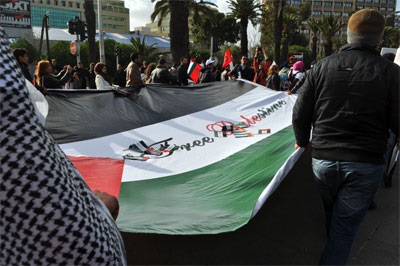 50,000 people gathered in Tunis, Tunisia the last week of March for the World Social Forum (WSF) to debate how to make a better world to serve the interests of humanity rather than corporations.
50,000 people gathered in Tunis, Tunisia the last week of March for the World Social Forum (WSF) to debate how to make a better world to serve the interests of humanity rather than corporations.
The World Social Forum began in Porto Alegre, Brazil almost fifteen years ago as civil society’s response to the domination of society by wealthy corporate interests. The idea was to organize a broad, inclusive, popular movement that would focus on social concerns as a counterpart to the exclusionary World Economic Forum that meets in Davos, Switzerland.
The forum typically meets in places where it can collaborate with and advance ongoing social movements. In addition to Brazil, the WSF has previously met in Mumbai, India; Caracas, Venezuela; and Dakar Senegal. The WSF also spun off local, regional, and thematic forums.
The WSF previously met in Tunis in 2013. It selected the site because of its symbolic representation in launching the so-called Arab Spring. In December 2010, a young street vendor named Mohamed Bouazizi set himself on fire in Tunisia in protest of the humiliation of having a municipal official confiscate his wares. His death triggered protests that led to the resignation of longtime president Zine El Abidine Ben Ali after 23 years in power. The Tunisian unrest led to protests that swept across the Arab world.
Forums typically take on a local flavor, and true to form most of the discussions in Tunis were in Arabic and French. The WSF also attracts social movement activists from around the world, and their presence enlivens the debates. In Tunis, participants represented more than 4,000 organizations from 130 countries.
The WSF initially focused on the twin issues of opposition to neoliberal capitalism that deprived people of the necessary resources to meet their social needs, and militarism that led to George W. Bush’s endless wars in Iraq and Afghanistan. The WSF’s organizational process led to a fundamental political transformation in South America. As a result, today most of that region is governed by leftwing governments that have shifted resources to meet human needs rather than benefiting only a few wealthy people.
Fifteen years on, participants in the forum continue to debate how to confront the challenges facing humanity. Among the most important themes in Tunis were freedom for Palestine, women’s rights, climate change, and the rights of migrants. Participants also debated how to most effectively engage political changes to make the world a better place to live.
Among those present at the forum were activists dedicated to free access to information. Workshops included strategies on how best to use the media to advance human needs. Activists brought a proposal to redesign the internet to respond to human concerns rather than advancing commercial interests and being used as a tool for government surveillance. Julian Assange spoke to the forum via video conference from the Ecuadorian embassy in London where he is seeking asylum from extradition to the United States for his role in the wikileaks revelations.
The forum opened only days after the March 18 ISIS attack on a group of international tourists in Bardo museum that left 22 people dead. As a result, the theme of terrorism underlay the forum. Organizers released a statement denouncing terrorism that received criticism for echoing the language of Bush’s war on terrorism that most participants would see as inconsistent with the forum’s anti-imperialist agenda. The day after the forum and separate from it, the Tunisian government organized a massive march against the attacks.
As with most forums, the Tunis meeting was bracketed with a set of its own marches that championed the variety of causes and themes discussed at the forum. In response to the attacks, organizers rerouted the opening march to end at the Bardo with a ceremony in which the Ministry of Culture formally reopened the museum. The closing march expressed solidarity with the Palestinian people. It left from Tunis’ revolutionary square and culminated with a rally at the Palestine embassy.
The next opportunity to join the social forum process is at the United States Social Forum from June 24 to 28, 2015. After previously meeting in Atlanta in 2007 and Detroit in 2010, this time the USSF will hold simultaneous meetings in Philadelphia, Pennsylvania and San Jose, California.
As with the global forums, the USSF seeks to build stronger relationships and collaborations in a unified struggle for social justice. More information on how to join the struggle for a better world for all of us is available at https://www.ussocialforum.net/.
